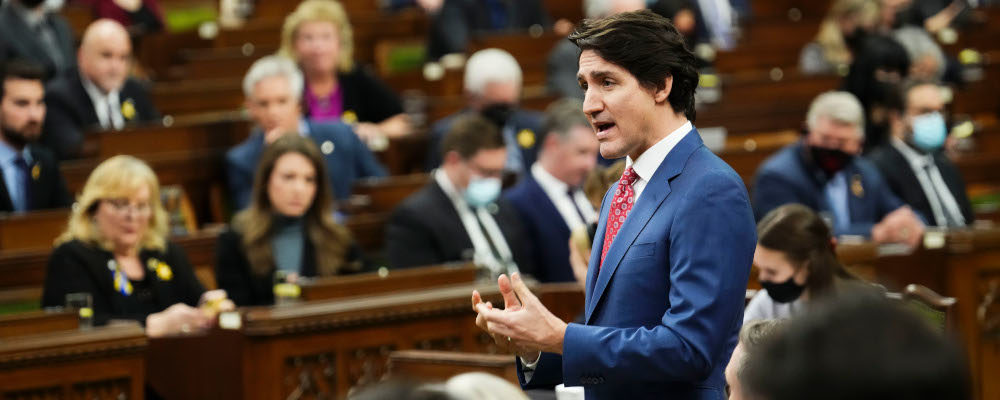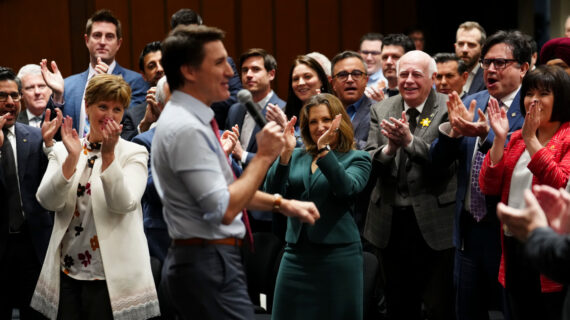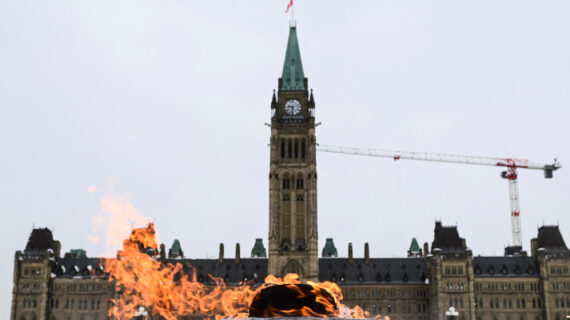As a rule, cynicism about politics and politicians is healthy. Given the state of our Parliament, it’s certainly easy. Pierre Trudeau famously said that members of parliament (he was addressing opposition members specifically) are nobodies once they get 50 yards from Parliament Hill. That was generous—it assumes they are somebodies when they are on the Hill.
More often they find themselves compared to trained seals, tractable sheep, and other dumb animals.1Tory Jackass Moves To Quash Right To Privacy With Orwellian Move As far as I am aware, the first ovine analogy came from the British MP Christopher Hollis in a gloomy tract from 1949 titled “Can Parliament Survive?”2Can Parliament Survive? Hollis wrote (presumably from experience):
The member is the obedient servant of the party machine. He tramps into the division lobby voting for or against he knows not what … As things are now, it would really be simpler and more economical to keep a flock of tame sheep and from time to time to drive them through the division lobbies in the appropriate numbers.
As far as cost-cutting suggestions go, it’s not a terrible idea. We might even save on mowing the lawn in front of Parliament.
It’s no worse, at least, than the recent proposal in these pages3Canada has too many MPs to cull the flock, er, reduce the size of the House of Commons. I don’t mean to be hard on Mark Johnson, who made probably the best possible case for fewer MPs. His problem was that there is no good way to make the case for a bad idea.
Let’s start with the obvious. Johnson’s proposal to reduce the number of MPs and create ridings of equal population would require a constitutional amendment. That is not happening. Setting aside the territories, 28 of the 30 smallest federal ridings (by number of electors) are in Atlantic Canada, Saskatchewan, or Manitoba. None of those provinces is going to approve a plan to cut their representation.
So much for the idea in reality, but what about its merits in theory? Johnson’s main arguments are that: Canada was governed just as well (or at least no worse) 22 years ago with 40 fewer MPs; more MPs inevitably means bigger government; and we will save the cost of their salaries and staff budgets.
It’s hard to dispute the first argument, if only because I don’t know how we would measure differences in the quality of government over such a short time. But Johnson is probably right that a Parliament of 300 MPs vs a Parliament of 340 MPs wouldn’t make much difference because increasing or decreasing the size of a group by 10 percent doesn’t change its basic structure or its internal dynamics. (More on what would later.)
The second point confuses the role of the House of Commons with the role of the government. There are very few opportunities for MPs to increase the size of government. Members do not initiate legislation, except through rare and mostly symbolic private members bills. It is not Parliament’s job to govern, but to scrutinize the government’s actions and debate its proposals. And if there is one thing we could use more of in Canada, it is more debate and more scrutiny.
As for the savings to Canadians, cutting 40 MPs would save about $20 million, or 1/17,750th of the federal budget.
Anticipating an objection that larger constituencies would mean worse service for constituents, Johnson assures us that private “[c]ompanies regularly downsize their workforces but achieve the same outputs.” Of course corporate “outputs” aren’t the same thing as customer service, as anyone who has spent time waiting to be connected to an overseas call centre can tell you.
But I am not just here to shoot down a proposal, especially one that is already dead on arrival. I have, wait for it, my own “bold new idea.” Let’s go the other way and increase the size of the House of Commons.
Doubling the number of MPs would be procedurally simple—we could just split each existing riding and not have to worry about constitutional futilities. That would exacerbate some distortions of representation, but then the Westminster system has never been fussy about strict adherence to representation by population. Nor, I might add, would it be the first federal make-work scheme for Atlantic Canada, or close to the most wasteful.
We should expect a larger House of Commons to produce better government. One of the open secrets of Canadian politics is the flamboyant incompetence of most federal cabinet ministers. This is not a partisan point. Once you get past the handful of sage and competent ministers in any government, the talent level drops off like a continental shelf. Remember that it took electoral defeat to finally dislodge the cherubically vacuous Maryam Monsef from cabinet.
The need for diversity in building a cabinet, especially regional diversity, already narrows the choice of ministers considerably. More MPs should increase the chances of quality appointments and reduce the need for tokenism. It’s simple math. Doubling the size of the House of Commons would mean more members in each region for a prime minister to choose from.
In the U.K., with 650 MPs, a prime minister with a majority government has at least 326 MPs from which to choose about 22 cabinet ministers and another 100 junior members of the ministry. The result is a generally (though not uniformly) higher quality of minister. (Yes, the U.K. population is almost double ours, but we are almost 40 times bigger. The constituency farthest from Westminster is Orkney and Shetland, about 1000 km away; the same drive starting in Ottawa and heading West wouldn’t even get you out of Ontario.)
The flip side of a larger caucus that offers more choices for cabinet is that also leaves more members out of cabinet. That is a good thing for national governance because a large backbench is a restless backbench. In the U.K., having more MPs with little or no chance of cabinet appointment has meant more independence and a stronger sense of collective backbench identity. This comes closer to replicating J.A.G. Griffith’s4“John Aneurin Grey Griffith, FBA (14 October 1918 – 8 May 2010) was a Welsh legal scholar.” https://en.wikipedia.org/wiki/J._A._G._Griffith idea of a parliament divided into three parts—government, opposition, and backbench—with a government that has to worry as much about members behind it as those across from it.
Johnson worries that more MPs means more “idle hands” creating make-work for themselves, but in the larger British parliament, those idle hands have been put to productive use on much stronger parliamentary committees. This includes genuinely independent and bipartisan specialist committees like the Joint Committee on Human Rights and the Joint Committee on the National Security Strategy, which would be unthinkable in the Canadian parliament.
I understand the instinctive skepticism about what looks like a proposal for larger government. But one lesson I learned working inside government is that more political oversight usually means better government, not necessarily more government. Or to return to the terms of the political menagerie, a bigger House of Commons would mean more watchdogs and fewer sheep.




